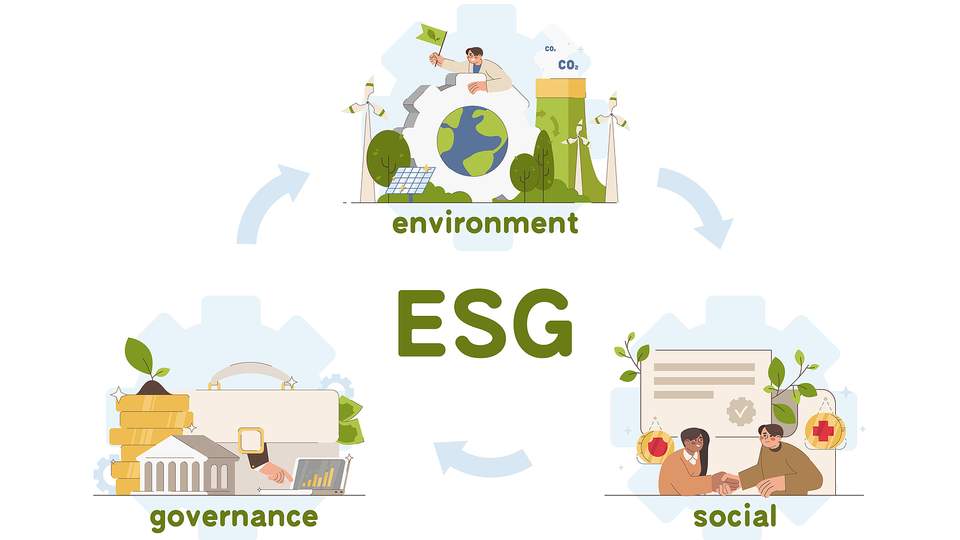Corporate sustainability is more crucial than ever and is a smart strategy for creating a more agile, attractive and future-proof organisation.
Yet, for many companies, it remains a challenge. They've introduced LED lighting, started cycling to work and signed green energy contracts. But what’s next? How do companies move from scattered initiatives towards a comprehensive sustainability strategy embedded in policies? And how can you keep it manageable
To help you get started, here are five practical tips.
1. Map what you’re already doing
You might be doing more than you think already. Use a framework such as the SDGs or ESG criteria to map your existing initiatives. Take the solar panels and charging stations you’ve installed, the project to offset CO₂ emissions or how you’re working towards creating an inclusive workplace.

At DNS Belgium, corporate social responsibility is no longer just about reducing our ecological footprint. Good governance is a key aspect of sustainable business practices. By communicating transparently, creating an inclusive HR policy, promoting a healthy work-life balance, offering training opportunities for employees and fostering a supportive organisational culture, we actively contribute to the S (Social) and G (Governance) aspects of our ESG framework.
2. Set realistic long-term goals
Set long-term goals and work with feasible, quantifiable intermediate goals. Think in terms of years, not weeks - but be specific.
DNS Belgium's journey began in 2016 with a baseline measurement and an inventory of what we were already doing. We took a broader perspective on sustainability beyond just environmental impact and mapped our actions against the 17 SDGs.
That was already a good starting point. However, there’s nothing wrong if you start with small, straightforward actions to reduce your environmental impact. Tackling the so-called low-hanging fruit allows you to make quick progress.

Even the smallest actions were part of our long-term strategy until 2025 and were fully embedded in our organisational policy. The intermediate goals we set led to recognition first from Voka and then UNITAR, the United Nations training and research centre as SDG Pioneer, Champion and Ambassador.
In 2024 we updated our sustainability strategy and formulated actions and objectives to be achieved by 2030.
3. Involve employees and partners
To achieve your goals, you must at least involve your employees in the sustainability initiatives. Involve them in initiatives as much as possible, let them share ideas and provide feedback on your actions and strategy, etc. Let sustainability become an integral part of your organisation.

Big ambitions cannot be achieved by an organisation alone. You need to focus on your entire value chain and include customers, suppliers, competitors, and industry organisations in your project.
DNS Belgium not only takes a closer look at its own activities, but also at what precedes and follows our activities. We do that by promoting sustainability at our suppliers (upstream) as well as our registrars and registrants (downstream).
4. Be transparent, even about areas for improvement
Developing and implementing a sustainability policy is a long-term commitment, a process of trial and error. Not every action will be as successful as you hoped and not all initiatives will yield quantifiable results.
Share what you’re doing, explain what has worked and what hasn’t worked and what you aim to improve in the future. This boosts your credibility and can help or inspire others to follow suit
We regularly communicate about our sustainability efforts and initiatives. We clearly indicate what our impact is, which risks and opportunities are connected to them and how we involve our stakeholders in this.

Apart from sharing our experience and knowledge with the sector, we’ve also published an annual sustainability report since 2017.
5. Be inspired by others
Look at how colleagues and competitors approach sustainability. Find inspiring (and ambitious) examples within and beyond your sector and translate them into a plan that fits your organisation.
.be Sustainable aims to encourage registrars to set their own sustainability goals, respect corporate social responsibility principles and make their operations, processes and policies more sustainable. We don’t just share how DNS Belgium tackled sustainability, we also provide tips and best practices from registrars for registrars.
Too much jargon?
Sustainability comes with its own terminology like SDG, ESG, CSRD, etc. Sound complicated? Don't worry.
We’ve provided an overview of some of the most commonly used sustainability concepts.
CSR: Corporate social responsibility
This means that as a business, you're aware of your positive and negative impact on society and the environment and take responsibility to maximise the positive impact while minimising or eliminating the negative impact in your business operations.
SDG: Sustainable Development Goals
The United Nations adopted 17 Sustainable Development Goals (SDGs) in an agreement with 193 countries in 2015. Together, they form the 2030 Agenda, because the signatory countries undertook to contribute to achieving these goals by 2030.
ESG: environment, social and governance
While CSR focuses on individual, voluntary initiatives, ESG comes from the financial sector to assess investment opportunities based on their sustainability efforts in terms of Environment (E), Social (S) and Governance (G). In other words, ESG is a framework designed to measure an organisation’s sustainability performance across a wide range of parameters. In addition to corporate social responsibility, ESG places additional emphasis on the good governance of an organisation.

CSRD: Corporate Social Responsibility Directive
The Corporate Social Responsibility Directive is a European directive that obliges companies to report on their sustainability efforts based on a wide range of data points. They are referred to as the European Sustainability Reporting Standards (ESRS) and comprise parameters about sustainability actions related to ESG.
VSME: Voluntary Sustainability Reporting Standard for SMEs
As CSRD legislation is quite extensive and complex, the European Commission provided a practical and feasible alternative, i.e. the Voluntary Reporting Standard for SMEs (VSME). They offer smaller organisations the opportunity to share structured data about their sustainability efforts with customers and suppliers.
We’re happy to help!
Do you want to start building a sustainable organisation but don’t know where to start? Or do you have a good example that can inspire others?
Contact our sustainability coordinator at channel@dnsbelgium.be or talk to your contact at DNS Belgium.

.be Sustainable

Our sustainability ambitions until 2025
25 February 2022-

.be Sustainable
With .be Sustainable, DNS Belgium wants to be an inspiring example for other companies and motivate them to be socially responsible. -

Our sustainability ambitions until 2025
25 February 2022DNS Belgium takes sustainability very seriously. Our new sustainability strategy create a framework for our actions and initiatives until 2025


